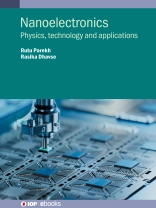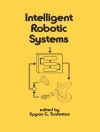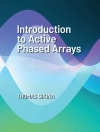This course text provides comprehensive coverage for fundamental and advanced courses in nanoelectronics. It provides insight into the future of electronics, emerging devices, logic and memory, sensors, systems architecture, nanofabrication, and the fundamental physics behind nanoelectronics. After reading the book, students will be able to understand the applications and design principles of nanodevices and nanosensors. The content is organised into nine chapters, each covering a specific area and written in accessible language. The topics covered include physical and technological limitations of nano CMOS devices, quantum physics, simulation and modelling, nanofabrication, emerging logic and memory devices and application areas including nanoarchitectures, sensors, and transducers. The book is a core text for senior undergraduate and postgraduate courses in nanoelectronics, and a valuable reference for researchers, engineers and specialists in fields including electronic devices, solid-state physics and nanotechnology.
Key Features
- Core text for senior undergraduate and postgraduate courses in nanoelectronics
- Brings together all related aspects of nanoelectronics, including quantum physics, nanofabrication, electronics and applications
- Provides insight into the future of electronics, emerging devices, logic and memory, sensors, systems architecture, nanofabrication, and fundamental physics
- Written in an accessible style and supported by diagrams, end-of-chapter summaries and questions to aid learning
สารบัญ
Preface
Acknowledgements
Author biographies
1 Physical and technological limitations of nano-CMOS devices to the end of the roadmap and beyond
2 Introduction and overview of nanoelectronics
3 Introduction to the quantum theory of solids
4 Emerging research devices for nanocircuits
5 Emerging memory devices
6 Modelling and simulation
7 Nanofabrication
8 Emerging nanoelectronic architectures
9 Nanosensors and transducers
เกี่ยวกับผู้แต่ง
Dr. Rutu Parekh is an Associate Professor at DA-IICT, Gandhinagar, India. She received her M. Eng. in Electrical Engineering from Concordia University, Canada, and a Ph D in Electrical Engineering (Nanoelectronics) from Université de Sherbrooke, Canada. She was a postdoctoral fellow at Centre of Excellence in Nanoelectronics, IIT Bombay. She is also associated with The Inter-University Centre for Astronomy and Astrophysics, Pune, India, as a Visiting Associate. She holds more than 20 years of national and international experience in research and industry. She has published many articles in international journals and conference proceedings. Her research area includes high voltage ASIC design for space applications and design, modelling, and simulation of nanoelectronic circuits.
Dr. Rasika Dhavse is an Associate Professor in the Department of Electronics Engineering at Sardar Vallabhbhai National Institute of Technology, Surat, India. She received her Ph D in the field of nanocrystal-based flash memory devices in 2016. She has more than 25 years of academic experience. She has published many papers in international journals and conference proceedings, and is member of various reputed national and international professional bodies.












